How to protect your mental healthpublished at 16:46 GMT 25 March 2020
While we wait for Boris Johnson's press conference to start at 17:00GMT, here is our guide on how to protect your mental health during the outbreak.
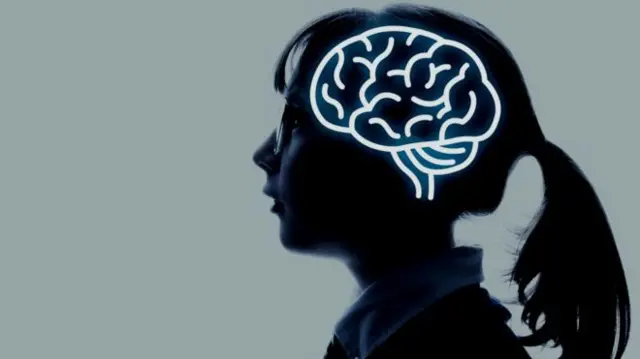 Image source, Getty Images
Image source, Getty ImagesGlobal death toll passes 20,000; confirmed cases 450,000; 110,000 people have recovered
A quarter of the world's population is now living under some form of lockdown
New York reports more than 25,000 cases but the governor says social distancing appears to be working
President Donald Trump promises the US economy will take off "like a rocket ship" once the situation improves
Prince Charles - heir to the British throne - tests positive for virus with "mild symptoms", palace says
India's 1.3 billion people went into lockdown at midnight, with a "total ban" on leaving homes
Russia's Putin postpones vote on constitutional change allowing him to stay in power
The death toll in Spain has overtaken China, in Italy cases fall slightly from Tuesday
Yaroslav Lukov, Gareth Evans, Emlyn Begley, Jennifer Scott, Paul Seddon, Helier Cheung, Claudia Allen, Mal Siret, Andreas Illmer and Saira Asher
While we wait for Boris Johnson's press conference to start at 17:00GMT, here is our guide on how to protect your mental health during the outbreak.
 Image source, Getty Images
Image source, Getty Images Chris Morris
Chris Morris
BBC Reality Check
It often feels like Italy and Spain are doing things much more rigorously and radically than in the UK.
But if you look at the rules in Italy, you can leave to go out for work if you have to, for medical reasons, to buy food, or go to the pharmacy. It doesn’t sound that dissimilar from what we have here.
The key difference is the enforcement of the rules. If you go out in Italy, you need to be carrying a piece of paper to specify why you’re out. The police are stopping people regularly. There are fines being issued.
In Spain, as of last night, there have been 926 arrests, 102,000 police reports filed for disobeying the rules and roughly 81,000 fines have been issued. If people under quarantine go out there's the potential of jail sentences.
We know that level of enforcement is something UK police are reluctant to get into. One of the key issues is how well the encouraging language works - the government saying we're all enlisting in a national effort.
If that works, the police won’t have to get as involved as they have in Spain and Italy.
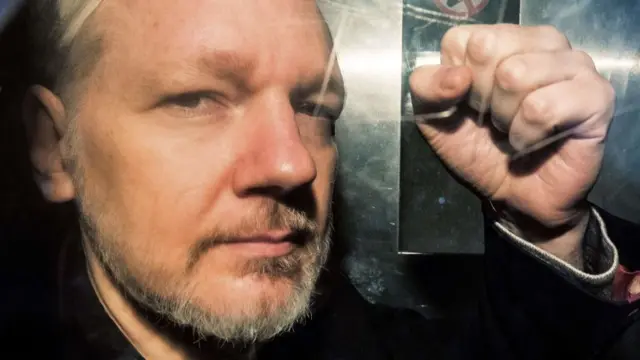 Image source, Getty Images
Image source, Getty ImagesWikileaks founder Julian Assange has been denied bail from a British prison after his lawyers said he was at particular risk of catching the new coronavirus.
Assange suffered several respiratory tract infections while in the Ecuadorean embassy in London, his defence said, and if he caught the virus in prison "the risk could be fatal".
But the judge at Westminster Magistrates' Court rejected the request, saying the Australian's past efforts to evade legal proceedings showed he might try to escape again if released.
"As matters stand today, this global pandemic does not as of itself provide grounds for Mr Assange's release," Judge Vanessa Baraitser said.
Currently in London's Belmarsh prison, Assange is wanted for questioning in the US for allegedly hacking and publishing military databases. The 48-year-old says the charges are politically motivated.
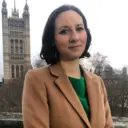 Helen Catt
Helen Catt
Political correspondent
There is mounting pressure on the UK government to do more for the self-employed.
Labour wants an equivalent to what is being offered to employees, the Liberal Democrats suggest compensation based on the last three years of people's tax returns, and the SNP would like to see existing schemes extended.
The government says there are logistical difficulties in working out how best to help.
Part of that is to do with how it gets the bank details of the self-employed.
It already has details of people who have a regular wage in the Pay As You Earn system.
But people who are self-employed tend to file their tax returns in arrears, so they don’t have the same access.
There is also an issue of fairness. While many self-employed people will see their businesses take a huge hit, others could see their income rise, so the government doesn’t want to put in a blanket system.
The government says the chancellor and the Treasury have been working hard to make sure well targeted, fair and deliverable support is provided.
Come tomorrow, we should get more on what the government’s plan is.
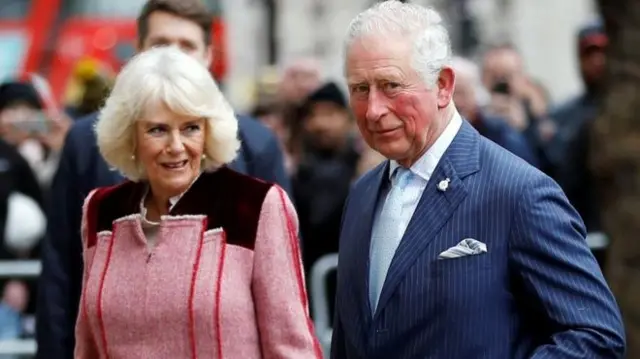 Image source, Reuters
Image source, ReutersWe are expecting UK Prime Minister Boris Johnson to hold a virtual press conference from Downing Street shortly.
But while we wait, here is a look at where the country is now in its battle with coronavirus:
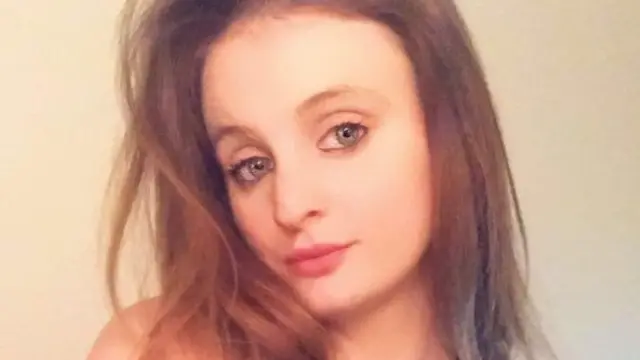 Image source, Facebook
Image source, FacebookA 21-year-old woman with no apparent underlying health conditions has died after contracting coronavirus, her family has said – as they urge the public to “do your bit”.
Chloe Middleton, from Buckinghamshire, is thought to be the youngest previously-healthy person in the UK to have died in the pandemic so far.
A man, 18, who died in hospital in Coventry at the weekend having tested positive for Covid-19 was being treated for “significant underlying health issues”.
Ms Middleton's mother Diane wrote on Facebook: “To all the people out there that thinks it’s just a virus, please think again. Speaking from personal experience, this so-called virus has taken the life of my 21-year-old daughter.”
Doctors around the world are battling against the new coronavirus, putting their own lives at greater risk in a bid to cure patients.
We've spoken to Dr Michelle Au, an anaesthesiologist in the US state of Georgia whose work now includes putting breathing tubes into patients infected with Covid-19.
She said that she and many other healthcare professionals are "basically behaving with the assumption that many of us will get it".
She told the BBC that a shortage of vital equipment means that masks intended for single use are currently being used until they are "visibly soiled or we can't breathe through them anymore, or the elastic breaks".
Dr Au recently moved into her basement to separate herself from her family, and she and her husband - who is also a doctor - are making changes to their will.
"You're very aware of the risks, but you're also very aware of the duty to your job. It doesn't make you not want to do it but you're aware constantly of the risk," she said.
Yolande Knell
BBC Middle East correspondent, Jerusalem
In line with its reputation as the "Start-Up Nation", Israel's high-tech sector is coming up with new applications to help in the fight against Covid-19.
From this week, a start-up called Vocalis Health, external is working with hospitals and the defence ministry to sample the voices of people who have tested positive - through a mobile app - to see if these samples show a "vocal fingerprint" that would help detect the virus in others. Artificial intelligence will be used to analyse the samples.
Another new app that has come online, called "The Shield" ("Hamagen" in Hebrew), external, can instantly tell people if they have crossed paths with someone known to have contracted the coronavirus. It was launched by the health ministry and takes location data from the user's phone to compare it to data on the known movements of confirmed cases in the two weeks before their diagnosis. If there is an overlap, the user is told and asked if they want to report their exposure.
The ministry promises that information shared is secure. But computer-privacy experts warn that the terms of use for the Shield app are far-reaching and allow the sharing of information with "the proper authorities".
Israel’s Shin Bet internal security service was controversially instructed to track the phones of infected people and send messages to those who had been in contact with them, ordering them to self-quarantine.
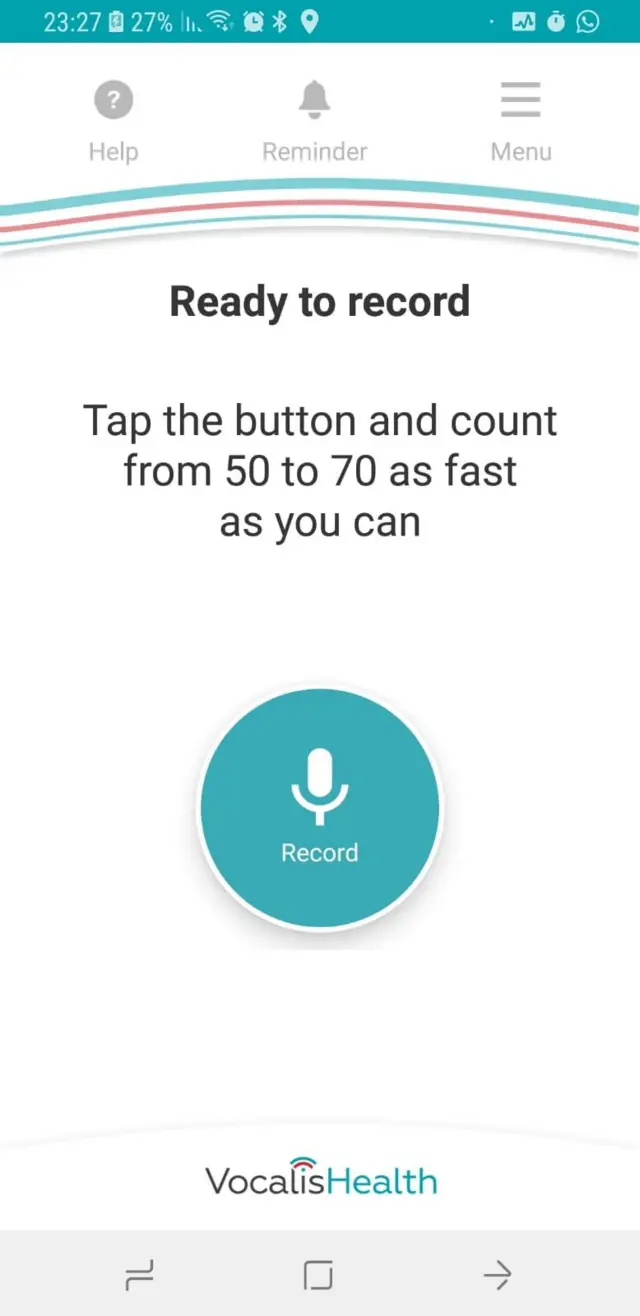 Image source, Vocalis Health
Image source, Vocalis Health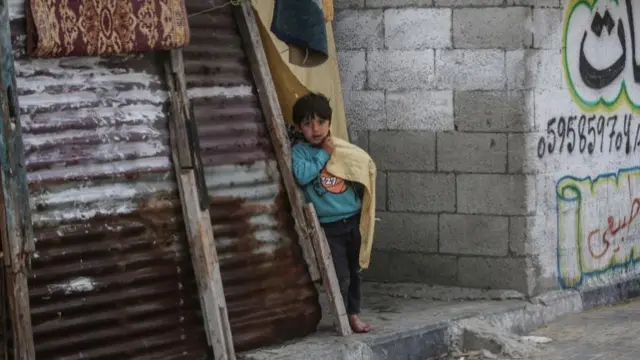 Image source, EPA
Image source, EPAA Palestinian child in the Gaza Strip, where the UN has warned that a Covid-19 outbreak could be disastrous
The United Nations has launched a huge humanitarian funding drive to help fight Covid-19 in the most vulnerable countries.
It is asking all states that can, to contribute to $2bn (£1.7bn) in cash for nations that will struggle to contain the outbreak.
The world body says a number of those countries are already devastated by conflict or natural disasters.
"To leave the world’s poorest and most vulnerable countries to their fate would be both cruel and unwise," warned the UN's Under-Secretary for Humanitarian Affairs, Mark Lowcock.
"If we leave coronavirus to spread freely in these places, we would be placing millions at high risk, whole regions will be tipped into chaos and the virus will have the opportunity to circle back around the globe."
It is hoped that the extra funds raised will provide vulnerable countries with laboratory test equipment, handwashing facilities in refugee camps and an airbridge for humanitarian workers to get to the worst affected areas.
Coronavirus: G20 'must step up for developing world'
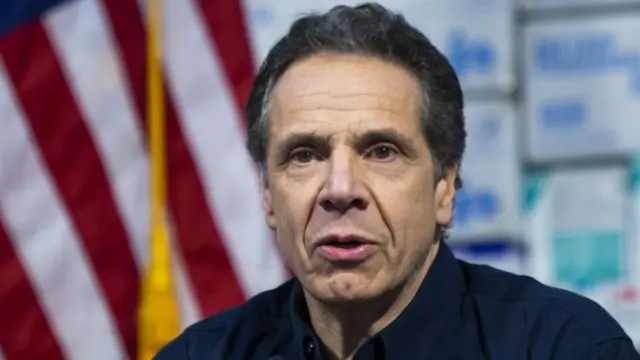 Image source, Getty Images
Image source, Getty ImagesHere are some more updates from Andrew Cuomo, the governor of New York state - which has almost half of all cases in the US.
Victoria Gill
Science reporter, BBC News
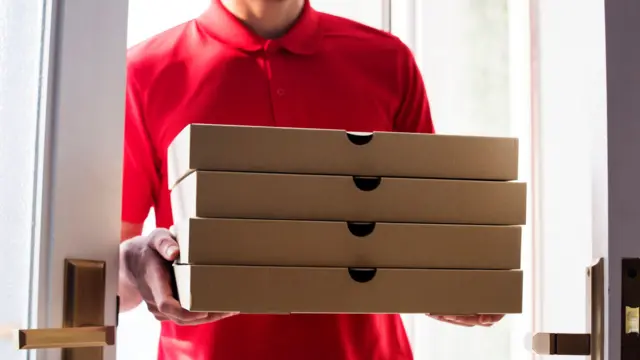 Image source, Getty Images
Image source, Getty ImagesMany of us are wondering about the risk of catching coronavirus from anything we touch - including food and packaging.
However, there is no evidence of Covid-19 being transmitted through food.
And while there is no such thing as "zero risk", says Prof Sally Bloomfield from the London School of Hygiene and Tropical Medicine, it is only the packaging - handled by other people - that would be of concern for potential transmission of the virus.
For takeaway food, you can minimise that risk, Prof Bloomfield advises, by: "Emptying the contents, disposing of the packaging into a refuse bag and washing your hands - thoroughly for 20 seconds with soap and water - before you eat."
How safe are delivered groceries?
Deliveries are far less risky than a trip to the supermarket, because the risk of transmission comes from surfaces – when a person with contaminated hands touches a surface, they can transfer the virus onto it.
So shopping for a vulnerable neighbour and delivering food to them would mean they could avoid that risky environment.
"We know that coronavirus does not 'breed' outside the body, so by the time [food] is delivered, any chance of infectivity is already lower because the virus starts to lose its infectivity as soon as it leaves the infected person," says Prof Bloomfield.
She suggests spraying or wiping plastic or glass containers with carefully diluted household bleach.
"For fresh goods - which were unwrapped when you brought them and could be handled by anyone - wash thoroughly under running water and leave to dry," she adds.
"It may be better for the moment, if possible, to stick to freshly cooked rather than raw foods, which will destroy any residual virus."
Coronavirus: How to wash your hands - in 20 seconds
New York Governor Andrew Cuomo is now giving a press conference. The state is the worst-affected in the US, with more than 25,600 cases - almost half of all the cases in the US.
Mr Cuomo says that the number of patients being admitted to hospitals has moved at a higher rate than projected - currently, they predict 140,000 people could require hospital treatment, although the state's hospital capacity is 52,000 - meaning that they need to rapidly increase capacity.
However, there's also positive news - Mr Cuomo said that evidence suggests that the state's density control plan was working - while hospital admissions are still increasing, the rate of increase has slowed. He cautions that projections are not always watertight - but "the arrows are headed in the right direction".
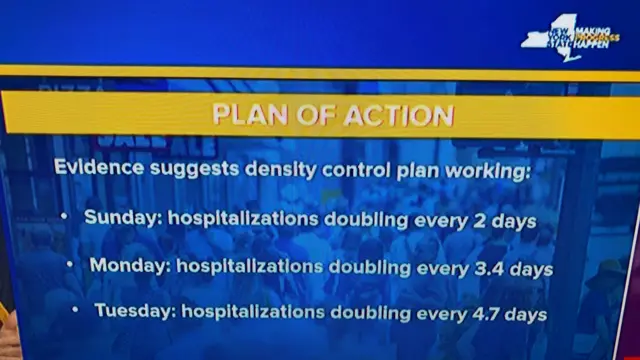
Earlier today, we reported that the Prince of Wales had tested positive for coronavirus.
Prince Charles, 71, is displaying mild symptoms, but is otherwise "in good health", according to a spokesperson. No other member of the Royal Family is believed to be affected.
Our Royal Correspondent Jonny Dymond gives an update on what we know so far:
Coronavirus: Prince of Wales tests positive
Eight-year-old Sophia is having to spend her birthday at home because of the current restrictions, but that did not stop the other residents of her street in Southampton joining forces to give her a special rendition of "Happy Birthday"...
Allow X content?
This article contains content provided by X. We ask for your permission before anything is loaded, as they may be using cookies and other technologies. You may want to read X’s cookie policy, external and privacy policy, external before accepting. To view this content choose ‘accept and continue’.
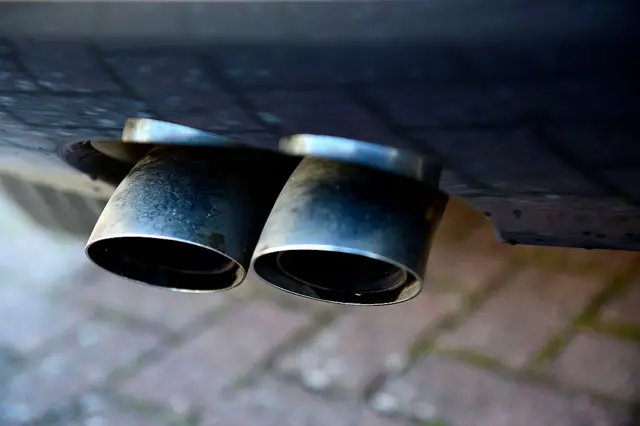 Image source, Getty Images
Image source, Getty ImagesEurope's major cities have turned into ghost towns over the past few weeks amid efforts to stem the spread of coronavirus. The European Environment Agency (EEA) says this has had one major health benefit - air pollution rates are plummeting., external
Over the past week, levels of nitrogen dioxide (NO2) in the Italian city of Milan have dropped 21% compared to the same week in 2019. Rome's average NO2 levels over the last four weeks were up to 35% lower than the same period last year.
It's not just Italy. In the week 16-22 March, Madrid's NO2 levels were down 41% compared with 2019, and Lisbon's rates were down 51%.
The EEA says the drop in levels is down to reduced traffic. But societies will need "ambitious policies and forward-looking investments" if they want to keep air clean after this crisis finally ends.
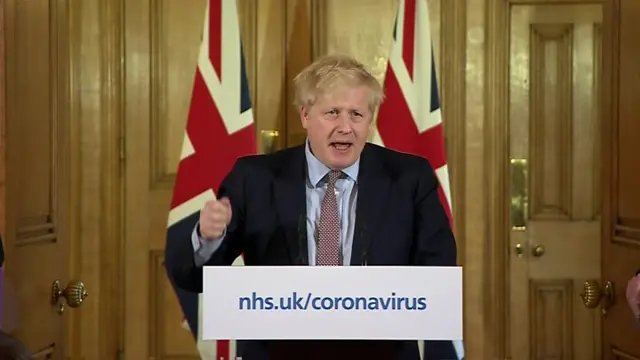
Boris Johnson will host a press conference later today, his spokesman has confirmed.
The UK government has been holding daily briefings throughout the crisis, but they are now done virtually - with journalists asking questions online.
We will bring you all the updates from the conference when it happens.
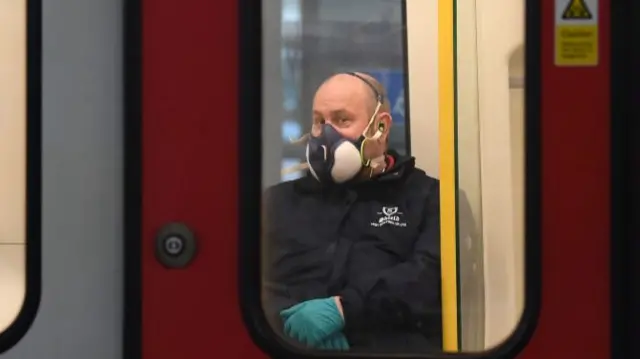 Image source, Getty Images
Image source, Getty ImagesThe UK government has confirmed it is not working with the European Union (EU) to secure more personal protective equipment and ventilators for the NHS.
Asked whether the UK was taking part in the Brussels scheme, Prime Minister Boris Johnson’s official spokesman said: "I think the short answer to that is no."
The EU has been working for weeks to acquire crucial equipment - like face masks and other medical products - since the coronavirus epidemic spread to the continent earlier this year.
A further six people with coronavirus in Scotland have died, taking the total number of deaths there to 22.
There have also been five more deaths in Wales, raising the toll there to 22, and a further two in Northern Ireland - which has now recorded seven deaths in total.
The figures for England, and the UK as a whole, will be released later. On Tuesday, the number of deaths in the UK stood at 433.
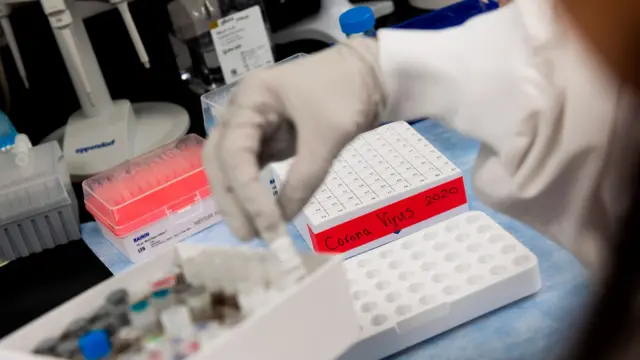 Image source, Gett
Image source, GettThe public will soon be able to conduct coronavirus antibody tests at home, the director of the national infection service at Public Health England says.
Prof Sharon Peacock told the science and technology MPs' committee that 3.5 million tests had been bought and would be available in the "near future".
She said the tests would allow key workers, such as doctors and nurses, to return to work if they have developed antibodies.
"Once we are assured that they do work, they will be rolled out into the community. Testing the test is a small matter, and I anticipate that it will be done by the end of this week," Prof Peacock said.
"In the near future, people will be able to order a test that they can test themselves, or go to Boots, or somewhere similar to have their finger prick test done."
Asked if tests would be available in days, rather than weeks or months, she added: "Absolutely."
Antibodies are produced by the body to fight off infection, and tests could indicate whether someone has had the disease in the past.
These tests could also help work out how widespread the disease has been.
India’s decision to enforce a lockdown on its 1.3 billion people means that at least a quarter of the world’s population of 7.8 billion is now living under tough restrictions on movement and social contact.
From Rwanda to California and New York to New Zealand, the coronavirus has shut down large parts of our planet – leaving normally heaving streets deserted and towering office blocks empty.
And there’s more to come – about half the US population are believed to be living under stay at home orders and measures are expected in further states. From midnight on Thursday, all South Africans will have to stay at home for a 21-day period.
Over the last few weeks, you will have kept hearing that the coronavirus crisis has changed the world. The fact that so many of you reading this will be doing so from home, because you’ve been told to stay inside, is perhaps the starkest illustration of how this has affected all of us.
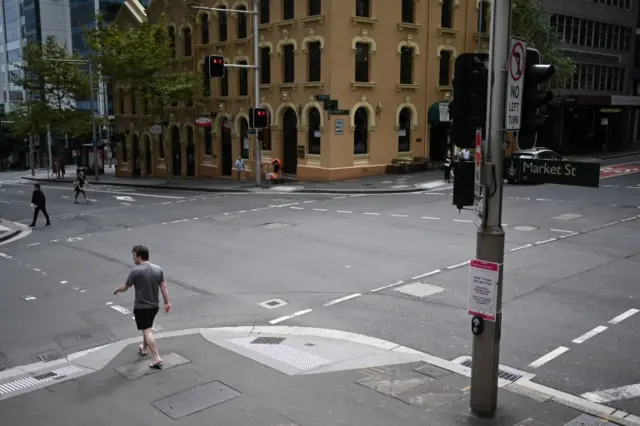 Image source, Reuters
Image source, ReutersStreets in Sydney's Central Business District are largely empty
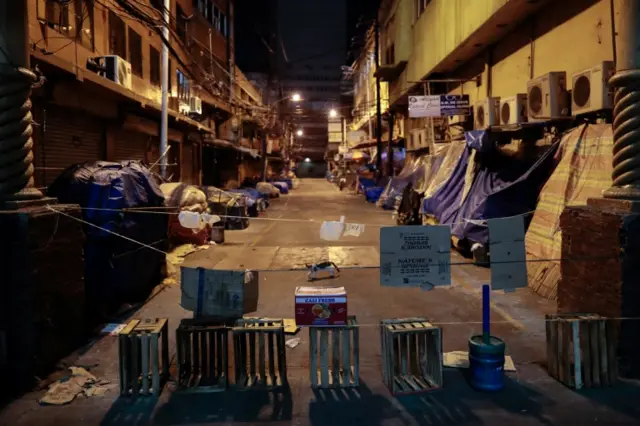 Image source, Reuters
Image source, ReutersThe entire region around Manila, the Philippine capital, is under strict quarantine